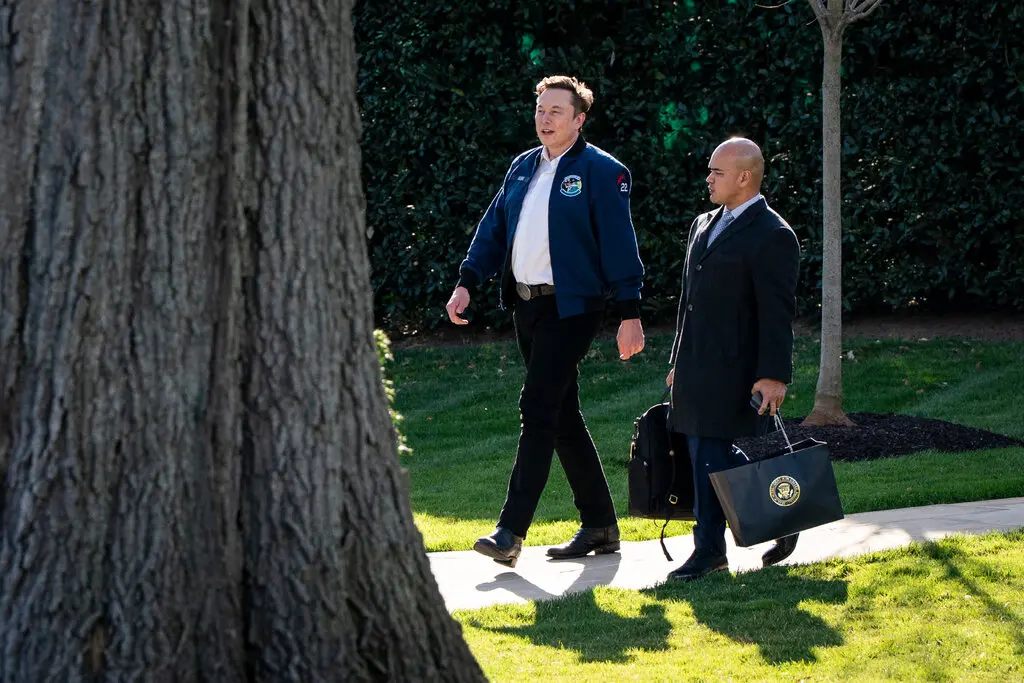In a week already shaken by steep losses in the global financial markets, an unexpected feud has erupted between two of President Trump’s closest allies — Elon Musk and Peter Navarro. The public spat sheds light on growing internal divisions within the administration as the economic consequences of sweeping new tariffs begin to take shape.
On Tuesday, Musk lashed out at Navarro, Trump’s chief trade adviser and architect of the controversial tariff policy, calling him “dumber than a sack of bricks” in a scathing post on X, the social platform Musk owns. The comment came after Navarro criticized Tesla’s global supply chain, arguing Musk’s company was “more of a car assembler than a manufacturer.”
Tensions Rise Within Trump’s Inner Circle
This isn’t just a clash of personalities — it’s a deeper reflection of strategic differences within Trump’s administration as it navigates a turbulent economic landscape. Since the announcement of the new tariffs on April 2, global markets have taken a hit. The fallout has also personally impacted Musk, who has reportedly lost over $31 billion in net worth, according to the Bloomberg Billionaires Index.
What makes this feud especially notable is Musk’s position as a high-profile supporter of Trump. He invested hundreds of millions into backing Trump’s re-election campaign and has served as a key voice within the administration’s tech and innovation strategies. But when it comes to trade, Musk is drawing a line.
Read Also: Oil Prices Drop Sharply as Trump’s Tariffs Raise Global Economic Fears
“Zero Tariffs” vs. Economic Nationalism
Musk has made it clear he doesn’t support the new protectionist approach. Instead, he advocates for “zero tariffs” between the U.S. and Europe, arguing that global collaboration, not isolation, is the path forward.
In contrast, Navarro has long pushed for aggressive trade restrictions aimed at boosting American manufacturing. He has defended the tariffs as essential to protecting U.S. jobs and industries, rejecting claims that they are simply a negotiation tool.
The clash intensified after Navarro belittled Tesla’s global manufacturing strategy, which sources components from several countries. Musk responded by calling him a “moron,” even going so far as to post, “I apologize to bricks — that was unfair to bricks.”
Later, Musk added a controversial insult, calling Navarro “Peter Retarrdo,” a remark that drew criticism across social media for being offensive and unprofessional.
White House Response: Downplaying the Drama
The White House, for its part, is attempting to downplay the conflict. Press Secretary Karoline Leavitt brushed off the exchange, stating, “Boys will be boys, and we will let their public sparring continue.” But behind the scenes, the tension reflects a deeper policy divide that could complicate Trump’s efforts to maintain unity within his second-term cabinet.
Navarro, who remained silent when asked about Musk’s comments, has long been a polarizing figure. He served in Trump’s first term and even spent time in jail for contempt of Congress after refusing to testify about the January 6 Capitol riots. Still, he has remained a loyal and vocal champion of Trump’s economic nationalism.
Musk’s Influence — and His Breaking Point
While Musk is known for controversial tweets and bold statements, his criticism of Trump’s policy — and by extension, his top advisers — marks a turning point. It shows that even Trump’s closest allies are willing to challenge him when business and economics are at stake.
Musk’s brother, Kimbal, also entered the fray, accusing the administration of imposing a “permanent tax on the American consumer” through tariffs. His posts added to the growing chorus of concern from the business world about the long-term impact of the new policy.
A Broader Pattern of Conflict
This isn’t Navarro’s first clash with fellow Trump allies. Many former aides from Trump’s first term have voiced frustration over Navarro’s aggressive stance and tendency to insert himself into policy areas outside his expertise.
Marc Short, former chief of staff to Vice President Mike Pence, commented, “If any memo from Peter reached the vice president, I viewed it as a failure on my part.”
Even within the current administration, there’s confusion. While Navarro insists the tariffs are here to stay, Treasury Secretary Scott Bessent has signaled that Trump is open to renegotiations, suggesting that the tariffs could serve as a bargaining chip.
What Comes Next?
With global markets shaky and America’s top billionaires at odds with the administration’s economic strategy, the situation is far from settled. Trump has yet to weigh in publicly on the Musk-Navarro feud, but his decision could influence both policy and perception.
As the world watches this drama unfold, one thing is clear: the future of U.S. trade — and possibly the stability of Trump’s inner circle — is hanging in the balance.

